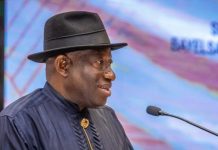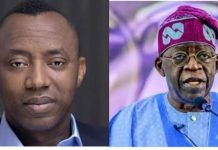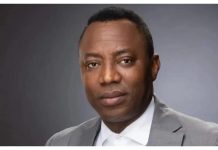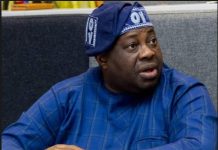Former President Goodluck Jonathan’s now famous statement about being the most insulted president in the world who gave Nigerians “total freedom” they would miss after he left office, may sound somewhat hyperbolic. Afterall, his government arrested journalists’ and he sent soldiers to quell a protest.
But the overall import of Mr Jonathan’s claim echoes through the consciousness of Nigerians today.
Four years after Mr Jonathan concluded a five-year stint that was largely deemed a breakaway from the country’s brutal autocratic past, his immediate successor has been dogged by relentless allegations of brutal repression that invoked memories of a dreadful past era.
On August 3, security agencies invaded an apartment used by Omoyele Sowore in Lagos and forcefully took him away. Mr Sowore, publisher of Sahara Reporters, is a good governance advocate and activist. He contested and lost the 2019 presidential election.
Mr Sowore had urged Nigerians to demand an end to bad governance and insecurity in simultaneous protests planned across 21 cities from August 5. The police said the protest was “an act of terrorism,” and a call to overthrow Mr Buhari.
When Nigerians took to the streets on August 5 to carry out the protests for which the government arrested Mr Sowore to prevent him from taking part, they were met with violence from security forces who also took dozens into custody across the country. Journalists who tried to cover the events were not spared from attacks.
Pro-democracy campaigners said the development added to a worrying trend of repression by the current government.
Mr Buhari assumed office in May 2015 on the back of a campaign that urged Nigerians to overlook his dictatorial antecedents and give him a chance to redeem himself as a “converted democrat.”
Old habits die hard
But four years on, Mr Buhari has been accused of looking away as federal authorities under him enforce an expansive crackdown on civil rights guaranteed by the Constitution.
While the use of state agents to crush dissent is not entirely new, some commentators are now rating Mr Buhari’s reign as the perhaps the most heavy-handed of the four administrations Nigeria has had since civil rule returned in 1999.
“It is not by accident that only those who speak up against the Buhari regime are being attacked by security forces just as we had it in 1980s when he first led us as a military dictator,” said public affairs commentator, Adewale Shotubo. “We have seen Fulani leaders come on national television to threaten violence without any invitation from security agents, much less an overnight break-in at their residence.”
Mr Buhari’s military junta between December 1983 and August 1985 is widely adjudged as one of the most repressive of African dictatorships. Civil rights activists and journalists were jailed with retroactive decrees that prohibited ‘defaming’ a government official.
With his return 30 years later as a democratic leader, Mr Buhari found other grounds to implement repressive tactics, Mr Shotubo said. Since 2015, many critics have been arrested for exercising their rights to speech or assembly and journalists also held for carrying out their constitutional duties.
Advertisement
SGF Campaign AD
“This administration started with a glaringly partisan anti-corruption farce that was targeting only leaders of the opposition, then quickly turned on ordinary Nigerians after many of the opposition targets joined the ruling party to preserve themselves,” Mr Shotubo said. “But it is now clear to adherents of civil liberties across the world that fascism has unfortunately returned to Nigeria.”
“If you are not tagged as corrupt, you will be tagged as seditious,” the analyst added. “It is difficult for any vocal Nigerian to escape their vindictive ruthlessness unless you are a part of them.”
My protest better than yours
Ironically, for 12 years before he finally became president, Mr Buhari agitated for a better Nigeria with highly objectionable comments. He was never arrested for them because they were protected by the Constitution.
The then opposition leader once urged Nigerians to vote along religious lines, and also advocated the implementation of Sharia law across the country, against Nigeria’s constitution-provided secularity. He also took to the streets on several occasions to protest perceived wrongdoings of governments.
After losing his first attempt at presidency in the April 2003 elections, Mr Buhari launched a series of demonstrations across the country to make a case for a purported stolen mandate.
In one of the protests on September 25, 2003, in Kano, the police tear-gassed Mr Buhari and other members of his then-All Nigeria Peoples Party (ANPP) Progressives. The attack was blamed for the death of Chuba Okadigbo, Senate President from 1999-2000, a few hours after the protest was quelled.
The protest was not deemed treasonable or an act of terrorism against the Nigerian state, and Mr Buhari was not arrested.
After losing again at the 2007 general elections, Mr Buhari remained a staunch opposition leader against the administration of Umar Yar’Adua, even though they were both of the same hometown. He made several controversial statements on several radio and television appearances, but was never taken into custody.
In 2011, Mr Buhari ventilated again when he lost to Goodluck Jonathan. For the next four years, he would lead other opposition elements to protest different issues of interest to them, from fuel price hike to alleged electoral fraud.
Mr Buhari also hailed the Arab Spring that swept through the Middle East from 2011, seeing it at the time as mandatory for the long-suffering masses in the affected countries. He also encouraged similar agitations in Nigeria as an effective means of nudging a complacent government. He urged a revolution through the ballot.
President Muhammadu Buhari protesting in November 2014 President Muhammadu Buhari protesting in November 2014 (Photo Credit: The Nation)
A few months to the 2015 election that brought him to power, Mr Buhari again took to the streets with other members of then-opposition All Progressives Congress (formed in 2013) to demand improved economy and a free and fair poll.
Critics say the president is now curbing the same freedoms that brought him to power.
“They are clamping down on Nigerians who take legitimate exception to their government — something that Mr Buhari and his associates in the APC did for many years,” said Yinka Odumakin, a civil rights activist and politician. “They are telling us that their own protest was better than others’.”
“They were patriotic with their own protests but people now protesting against them should be seen as terrorists, something that is clearly against democratic norms,” Mr Odumakin said.
Mr Odumakin was Mr Buhari’s campaign spokesperson during the 2011 elections, and he said they issued several statements that took the government to cleaners at the time without being brutally violated by state agents.
Regime of ‘no protests’
Although the Buhari administration and security chiefs claimed Mr Sowore was only arrested because he used the word “revolution” in his agitation, there had been previous cases when Nigerians who did not make allusions to a revolution were prevented from holding protests by security forces.
In February 2017, the police frustrated a protest planned by TuFace, saying they had received intelligence that it would turn violent. The police suppressed the planned protest against economic hardship despite describing it as potentially “peaceful.”
In April 2018, the police illegally imposed a permanent ban on gathering at the Unity Fountain, a major square in Abuja where #BringBackOurGirls and other civil movements have held demonstrations for years.
They castigated former Minister Oby Ezekwesili and other Nigerians who were taking part in regular sit-ins at the location as constituting a ‘nuisance’ with their agitation.
About three months ago, the Buhari administration and security chiefs accused opposition figures, including Atiku Abubakar, of plotting a regime change in Nigeria through unconstitutional means.
Despite inundating Nigerians with the purported coup allegations, the government did not provide any evidence to the public. It also turned out that a document security chiefs claimed was circulated by alleged coup plotters did not exist.
Mr Buhari’s attorney-general, Abubakar Malami, also emphasised that the administration will continue to undermine individual rights of in favour of ‘national security’.
The actions of Mr Buhari bore identical similarities to the ‘cynical contrivances’ of Sani Abacha, a former military ruler, said Nobel laurete Wole Soyinka. Mr Soyinka was amongst the first set of leaders to condemn the arrest of Mr Sowore and other good governance advocates across the country.
What’s in a word?
Many Nigerians have rejected the government’s suggestion that the use of the word “revolution” is enough to justify a violent clampdown on citizens.
“A violent government sees violence in every statement,” Cheta Nwanze, lead security analyst at SBM Intelligence, said, dismissing government’s interpretation of Mr Sowore’s revolution rhetoric as “paranoid.”
“The meaning of the term ‘revolution’ is simple. It is simply a fundamental transformation. Revolution is not necessarily a war as claimed by the government and their lackeys, the violent part of a revolution is usually the subset called a ‘rebellion’.
“Historically, the Industrial Revolution and the Meiji Restoration were revolutions. Who died in either?” Mr Nwanze asked.
“What has Mr Sowore complained about? The rise in violence, the rise in kidnappings, pervasive corruption. Has the government addressed any of those?
“Eighty-six people were killed in violent incidents across the country last week, have any of the killers been caught? Fourteen people were kidnapped, have the kidnappers been arrested?”
Mr Buhari’s supporters, however, denied that he was paranoid or excessively brutal in his treatment of the opposition.
“There are videos of Mr Sowore and his associates threatening a revolution,” Ken Eluma Asogwa, a political strategist for the Buhari campaign, said. “This is someone that contested for election but failed. He tried a regime change through the ballot box but he could not achieve that and now he is calling for a revolution.”
Mr Eluma Asogwa said Mr Sowore’s words were weighty enough for security agents to move against him.
“Even though there is no evidence of that he could take over the government with violence, we do not think the way he is going about it should be ignored by security agencies,” he said.
“The results of the last elections are still being challenged at the tribunal and we do not have a verdict yet, so no one should be calling for a revolution,” he added. “This is a democratic government.”







